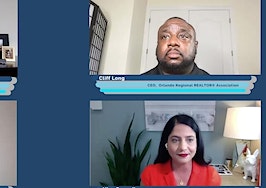The Council of Multiple Listing Services, a trade group of more than 200 member MLSs, is establishing a task force to explore how to promote and advance fair housing.
CMLS’s board of directors voted to establish the task force in August. The board seeks to understand the ways in which the MLS fosters and promotes fair housing currently and what untapped opportunities there are for MLSs to advance fair housing, CMLS CEO Denee Evans told Inman in a phone interview. CMLS devoted a full day of its annual conference last week to diversity, equity, inclusion and fair housing.
“I think it’s an extremely important topic, especially right now,” Evans said.
“We were getting questions from other organizations: ‘What was CMLS doing? What were MLSs doing?’ It was an ability for CMLS to really convene and answer the questions [of] what can MLSs do,” she added.
CMLS didn’t want discussion of fair housing to just be a one-day event, according to Evans. It seemed right to form the task force to continue the work and “take advantage of that opportunity to lead in this area and do the right thing,” she said.
At CMLS’s annual conference, which was held entirely online, a session called “What Can an MLS Do?” discussed just that topic: the steps an MLS can take to ensure fair and equitable access to housing.
“I don’t think it can be overstated by saying that the MLS is perhaps the greatest fair housing tool available in the real estate industry, and that’s for brokerages as well as consumers,” panelist Katie Johnson, the National Association of Realtors’ general counsel and chief member experience officer, declared.
She attributed that to the MLS’s core tenets: accuracy, collaboration and transparency. “As long as it continues to provide all of that in the real estate industry, it will provide the most access to real property for all people,” Johnson said.
Fellow panelist Jim Yockel, CEO of the Greater Rochester Association of Realtors, agreed that the MLS is “one of the most powerful tools” to promote fair housing.
“It’s hard to tell someone there isn’t something available in a particular neighborhood, when it’s right there on the MLS [and] on thousands of broker sites and agent sites and national portals,” Yockel said.
“That’s a really powerful tool to start eliminating what I call ‘opportunities for bias to exist,'” he added. “That’s the biggest one: When a consumer says, ‘Hey what’s available in this neighborhood?’ We can’t say, ‘Well, there’s nothing available right now’ because they can all see it for themselves.”
Panelist Myra Jolivet, a former MLS exec and now a communications strategist with real estate consulting firm WAV Group, noted that MLSs have an opportunity to increase awareness of unconscious bias through training.
“Having brokers and agents begin to recognize things that all of us need to recognize — we all have a bit of that. Training and awareness elevates it and brings it to a point where you realize, ‘Whoa, I’m about to break the law, and I hadn’t even thought about it,'” Jolivet said.
MLSs can also help educate agents about the history of fair housing, or lack thereof, according to Jolivet.
“I can’t tell you how many times people have said to me,’I don’t get why we even have to worry about these things. There’s no racism. There’s no this. There’s no that.’ I don’t know if people realize that the FHA [Federal Housing Administration] at one point would not authorize builders who sold to African Americans. That was after the New Deal of 1933,” she said.
“That lands within your consciousness. That’s a legacy. So when we’re trying to work to change something that has systemic origins, it takes a grander effort than just saying, ‘Okay, this is the law, and you will comply.'” she said. “I think we need a cause-and-effect discussion. I think we need to look at history, we need to bust some myths, and I think there are several layered approaches that MLS can play a role with.”
Johnson agreed and recommended real estate practitioners pick up a copy of Richard Rothstein’s book The Color of Law: A Forgotten History of How Our Government Segregated America.
“Read it or make it mandatory reading for your leaders because it provides a base understanding of where we’ve been. And I think you have to understand that in order to know where we want to go,” Johnson said.
“Homeownership is the creator of generational wealth. The fact that so many were unable to buy homes or homes of value decades ago has led to where we are now in the inequality of income and wealth status between races,” she added.
In regards to training, Johnson noted that NAR had created a sample equal services checklist and advised agents to use it with every single client to track and compare how they provide services to each. But there’s another area that’s particularly relevant to MLSs: data.
“That’s the untapped arena that we haven’t really looked into. One specific area that is notoriously problematic is school data,” Johnson said.
“The ratings, the rankings, and the school data that’s out there and just perpetuates racism, perpetuates the segregation of our communities. So I think as accuracy and transparency data providers that the MLS are, really digging into school data could be impactful.”
While common practice in the industry has been to point consumers to third-party sources for school data — precisely to avoid a fair housing issue — the problem is that the third-party sources for school data are flawed and the data is flawed, according to Johnson.
“So absent a correction, don’t use it. Go to the schools [and] make connections with the administrators. Have the agents on the ground. Have a contact at the school and say, ‘Hey potential buyer, I’d like to introduce you and give you a tour of the school’ and really let them know the community and the schools that way,” Johnson said.
Moderator Joe Rand, executive director of the Broker Public Portal, asked: When most brokers have agents that are independent contractors, what can the MLS do to ensure consistent experiences for consumers?
“The Newsday investigation … revealed that our members or the real estate professionals in Long Island weren’t always giving the same amount of properties or the same inventory of properties to people based on their race. If the MLS had an easy technological way to track who your clients are and what properties you’re giving them and then report on that, I think it raises the level of awareness and hopefully the level of consistency that all clients will get,” Johnson said.
Rand theorized that there could be a tool that allows an agent to generate a complete comprehensive list of all properties that comply with a certain price point. “Because price point is not the issue. The issue is geography, that they’re making decisions about where to show houses,” Rand said. If every buyer automatically got an email that shows them every property within their price point, “they can then look and say, ‘Well, why didn’t my Realtor show me these?'” he said.
Yockel agreed with that idea and pointed out an issue in his area. “We’ve heard in our region and others that agents feel like at the time an offer is made, sometimes the buyer puts in a great offer and maybe that offer isn’t accepted based on the name that appears on the purchase contract,” he said. “So why are we doing that? Why are we creating this opportunity for the seller to potentially unconsciously discriminate against a buyer based on the name that appears on the contract?”
Jolivet suggested that MLSs, if they haven’t already, enable anonymous tips to report improper behavior. “There was a hesitancy among agents [that] ‘If I report someone I may sit across from them next year [to do a] deal.’ So maybe part of the strategy is to eliminate those intimidation factors,” she said.
She also suggested forming strategic partnerships to develop quantifiable ways, such as paired testing, to identify discrimination.
CMLS’s Evans told Inman that the new task force will reach out to outside entities to help them evaluate the MLS’s role in fair housing and perhaps develop a fair housing assessment that MLSs can use to size up their own fair housing efforts. Already CMLS has spoken to Lisa Rice, president and CEO of the National Fair Housing Alliance (NFHA), Evans said.
“I’ve reached out to them to continue to educate myself and the organization to understand what are the opportunities, what do we need to be questioning,” Evans said.
“There’s the human side of it but how can we look at the technology side of it to understand the role the MLS plays. We had some preliminary calls with her team. They asked some great questions, not being familiar with the MLS. [We want to] look at the way it’s always been done and find ways to do it better.”
Other outside parties the task force may work with are Bryan Greene, NAR’s director of fair housing policy, and Dr. Nicol Turner-Lee, director of the Center for Technology Innovation at the Brookings Institute, who spoke at the CMLS conference on bias in algorithms.
As a result of Turner-Lee’s presentation, the task force will also consider whether MLSs should be asking the recipients of MLS data whether their use of that data will be in compliance with fair housing, Evans said.
She did not have an exact number for how many people will be on the task force, but says she’s been getting a lot of interest from CMLS members and hopes to have the task force finalized this month and have its first meeting in November.
“[This is] not short term. It is a larger project and a big ask. It’s important work,” Evans said.







